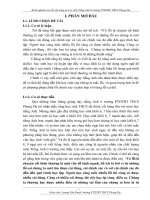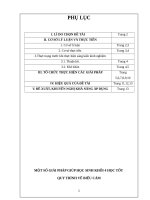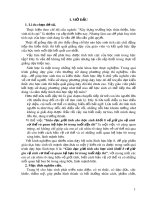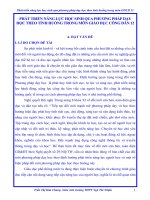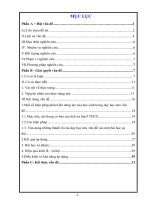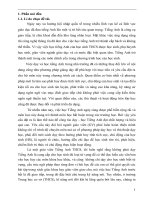(Sáng kiến kinh nghiệm) luyện tập kỹ năng nói cho học sinh khối 6,7 THCS
Bạn đang xem bản rút gọn của tài liệu. Xem và tải ngay bản đầy đủ của tài liệu tại đây (374.58 KB, 21 trang )
THANH HOA DEPARTURE OF EDUCATION AND TRAINING
HAU LOC DISTRICT DEPARTURE OF EDUCATION AND
TRAINING
-------------
PRACTICE SPEAKING SKILL FOR STUDENTS
GRADE 6&7
INDEX
EXPERIENCE IDEA
PRACTICE SPEAKING SKILL FOR STUDENTS
IN GRADE 6 AND 7
Wwritten by: Chung Van The
Position: Teacher
Work place: My Loc Primary and Secondary School
Subject: English
THANH HOA, YEAR 2018
PRACTICE SPEAKING SKILL FOR STUDENTS
IN GRADE 6&7
INDEX
Table of content
PART A. INTRODUCTION
Page
1
I. Reason selected themes.
II. Research objectives.
III. Research subjects.
IV. Research methodology.
1
1
1
1
PART B. PROBLEM SOLVING
2
I. Theoretical basic
1. End purpose of teaching a foreign language
2-Basic factors directly affecting success of a teaching session
2
2
2
II. The improvement of voice progress of students in My Loc Junior
high school.
1- General situation
2- Current situation
3- Evaluation of the current situation.
3
III. Some active solutions to improve an effective speaking.
1. Making lesson plan for a speaking session.
2. How to perform:
2.1. Speaking through classroom language:
2.2. Speaking through the practice of grammar structure.
5
5
6
6
7
IV- Appraisal.
1. For total qulity.
2. For total excellent.
16
17
17
PART C: CONCLUSION AND PROPOSAL
1. For infrastructure.
2. To upper leader
17
18
18
3
3
3
PART A. INTRODUCTION
I. REASON SELECTED THEMES
The goal of English is to create and develop a student's basic English
language skills and intellectual qualities necessary to continue to study or enter a
working life. New grade-level English books from the 6th to the 9th grade are,
therefore, compiled from the same point of view of the curriculum, which is the
point of view and emphasizes student-centered learning approaches.
All four skills in listening, speaking, reading and writing are considered and
coordinated in the tasks of classroom activities.
One of the four skills that English learners in general as well as secondary
school students in particular have difficulty in learning is speaking.
In fact, to learn English, foreign language learners must have a regular, longterm practice of speaking and speaking in the context of communication. Teaching
and practicing English speaking skills are not new but difficult for all junior high
school teachers and students. According to the old textbook program, there are no
listening lessons. Listening to English for junior high school is included in the
program since students are enrolled in the new program.
With this research, I would like to partly help teachers gradually overcome the
difficulties to conduct teaching English more effectively, students actively, actively
take on the acquisition, recognize the knowledge of the lesson.
II. RESEARCH OBJECTIVES:
By successfully researching the topic, this learning initiative will help
teachers gain the following experience:
- How to organize an effective speaking lesson.
- Steps to conduct an effective case.
- Instruct students to train themselves to be proficient, fluent in the next
teaching.
III. RESEARCH SUBJECTS:
The topic revolves around teaching research and practice for students to
improve their spoken skills for students in fine-grained junior high school. But the
case study subjects that I have boldly applied to this subject are Grade 6 and Grade 7
students.
IV. RESEARCH METHODOLOGY:
1. Observation method: I researched myself, conducted the class hour - visiting
class of colleagues.
2. Method of exchange and discussion: After the time of my colleagues, my
colleagues, my colleagues and I exchange and discuss in order to draw lessons for
the lessons.
3. Experimental Method: Teachers conduct teaching tests for specific purposes
requiring specific listening lessons.
4. Method of investigation: Teachers ask questions to check and assess the content
of the students.
PART B. PROBLEM SOLVING
I. Theoretical basic
1. End purpose of teaching a foreign language
The purpose of teaching foreign languages is not to provide students with
knowledge
of that language, the ultimate purpose of teaching foreign languages is to teach
students the ability to communicate in that language. Students' communication skills
are demonstrated through the following skills: Listening, Speaking, Reading and
Writing. Student's Speaking Skills are formed through one
The learning and training process in the communication environment. In
addition to studying at the school, students must study and practice themselves in a
variety of forms, modes and in a variety of communicative environments.
Speaking skill is the ability to use language knowledge for speaking and
understanding purposes in the language in which they are communicating.
2. Basic factors directly affect the effectiveness of a speaking session.
a- Teacher:
- With the new teaching method, the teacher plays the role of directing and
controlling students during class time.
- In order to conduct an effective listening lesson, the teacher should perform well
the following basic elements:
+ Select and use flexible teaching techniques appropriate to each content of
the unit
+ Organizing, controlling classes, distributing reasonable time.
+ Using proficient means, equipment teaching aids teaching speech.
+ Creation of teaching aids suitable for teaching.
+ Inspirational, attractive, attractive students.
b-The method of teaching speech.
Speech teaching is regulated by the content of a specific period of instruction, in
other words, the content of the unit teaches the choice and application of the
combination of teaching methods and techniques. Each teaching technique is
tailored to the specific form of instruction (vocabulary, structure, grammar, and
speaking technique: falling or raising intonation)
c. Teaching equipment and supplies for teaching speaking:
- The use of pictorial assisted instruction for foreign language in general and English
in particular is considered as a means of expressing part of the main textbook. In all
lesson units in the new textbook program, the content of the listening text is
recorded in the cassette tape, while the textbook only records the speaking exercises.
To do this, the learner must prepare the vocabulary, structure of the content before
doing the communication. In addition, teaching aids is an active means of
innovating teaching methods, motivating and motivating learning.
- The equipment and techniques needed during the lesson.
+ Pictures illustrate lesson contents in textbook.
+ Pictures, self-created teachers ...
+ Sample video.
+ Sound recording.
+ Create a situation in the process of communication.
d. Students:
In the relationship between teaching and learning: The teacher is the parent
dictatorship, control, and self-control of students by their own actions, their own
intellectual actions under the control of the teacher.
For good oral communication, students need to have the necessary skills in
listening comprehension in English.
II. The improvement of voice progress of students in My Loc Junior high
school.
1- General situation
The implementation quality of English teaching and learning is not high due to low
resident's qualification and awereness, poor
economy, insufficient and
asynchronous facilities.
Psychobiology of students: afraid of learning, speaking, making mistakes embarrass
with friends and teachers, some are lazy to study and do homework.
2- Current situation
a. Current situation of teacher
- Initially, the use of the teaching techniques of speech teaching was relatively good.
- Familiar and active with the way to organize a talk lesson.
- Coordinate flexible teaching techniques.
- Creation of teaching aids in accordance with the content of lessons, so many
lessons are becoming lively, attractive and effective.
- Using modern teaching equipment to serve the process
teach say: pictures ...
b. Current situation of student
- Students get used to speaking.
- Many students speak and recognize the volume, voice, intonation of native
speakers.
- Most students have learned some basic structure and some simple content.
- Some students have developed speaking skills, which are much faster in learning.
3- Evaluation of the current situation
a- Strong point
In spite of objective conditions directly affecting teaching, we have overcome
immediate difficulties and step by step improved quality of English speaking lesson
so as to meet the aims of textbook curriculum.
* Teacher
- Initially access and utilize typical speaking teaching techniques relatively well.
- Get familiar with and be active in organizing a speaking lesson sesson.
- Coordinate flexibly teaching skills in speaking lesson.
- Create many teaching materials in accordance with content of learning lesson;
therefore, the sessons become vivid and attractive with high effectiveness.
- Utilize and operate modern teaching equipment in reading, such as cassette tape,
DVD cassette recorder, video reader and multi-purpose projector.
* Students:
- Gradually get familiar with reading subject ( technique ).
- Students are able to speaking before the class and recognize content of the whole
speaking text.
- Most of the students are able to speak with simple content and complete tasks and
assigned by teacher after speaking in front ò the class.
- Some students have gained learning skills and tactics.
b- Weak point (Remainings)
* Teacher
It is still difficult for some teachers to implement teaching manipulation and
technique in speaking lesson as well as to techniques for specific teaching lesson
and session. They still hesitate to or unskillfuly utilize teaching materials for
speaking lessons, such sample cassettes and demonstrating pictures. For other
teachers, investment in lesson preparation is still limited due to private issues. In
addition, they are afraid of creating a noisy, time-consuming and costly teaching
session. The instruction of studying at home is not suitable for specific students,
which make the teaching session is not effective.
* Students
- Students are lack of motivation for English reading comprehension.
- Many students do not have much learning and communication opportunities as
well as access to mass media through which they can listen and speak English.
- Some hesitate to speak in English or are afraid of making mistakes.
- Students are not familiar with English reading and speaking speed in the tape or
disk.
- They remain passive habit; during team work they rely on other members.
- Words are produced timidly. Many students have not found their own English
learning method. Many others are not interested in reading books.
Therefore, in organizing activities, teachers should pay attention to avoid student's
negative responds. If this happens, teacher shall promptly correct and encourage as
well as reward students so as to achieve positive respond.
- During one English session in class, students of My Loc junior high school are
very active in exploring new knowledge. Most of them are ebullient and enthusiastic
in activities; however, this occurs only among good students.
c. Teaching measures and tools
- Teaching materials for teaching are too few: pictures, radio ...
- The quality of the tapes is not good.
d. Specific investigation:
During my teaching process, I have been in charge of grades 6 and 7. With
the aims of studying the current situation of student's English learning as well as
drawing lesson for myself, right from the beginning of the school-year, I have
oriented a specific plan and method to actively investigate the current situation of
English learning of my students. Findings of the investigation indicated that most of
the students do not soudly remember vocabulary and their communication skills are
still limited. To achieve the above-mentioned objectives, students should be trained
all the four skills including: listening, speaking, reading and writting during their
English learning. However, English curriculum at secondary school level
concentrates on the two basic skills only, which are speaking and writting. The other
two skills have not gained much attention; therefore, student's learning performance
is not high.
This issue is indicated by learning performance of students in the previous
year and findings of the survey on student quality conducted in some classes in
terms of English subject early last school-year ( 2014 - 2015 ).
5
9
22,5
15
37,5
Poor
%
Quaity
2
%
Weak
Quatity
40
%
Fairly
good
Quatity
6, 7
Good
Quatity
Quatity
Total
Excellent
number
Grade
of
student
%
s
%
8
20
6
15
Therefore, to find out a method to practice English speaking skill for students, I
have chosen this topic
III. Some active solutions to improve an effective speaking.
1. Making lesson plan for a speaking session.
a. For teachers:
For a good speaking lesson, the teacher should take the following steps:
- Studying the content of lessons from textbooks, teacher books because of
textbooks and teacher books is an important basis for teachers to plan teaching for
the lesson. The textbook research will help teachers organize, teach the right
teaching, focus, time distribution for steps, activities in a scientific way.
- Study the purpose of the lesson: The purpose and requirements of the lesson are
the goals that both teachers and students need to achieve after each lesson. For
vocabulary lessons, the purpose of the lesson is to help students practice and
develop their skills: Listening, Speaking, Reading and Writing. (in which listening
and speaking skills are essential). After finishing listening to the content of the
lesson and starting to make some requests or practice a small structure or
conversation.
- Select and coordinate teaching techniques in a flexible and appropriate way (based
on the content of lessons, characteristics, capacity of the classroom and the stages in
the process of teaching listening: Pre-listening, While- listening, post-listening). At
each stage there are teaching techniques with a particular characteristic.
- Good use of teaching aids, tools for teaching:
* Using the clay machine:
Before preparing to teach, prepare good machine, tape and battery
in case the electricity goes out.
+ It must be safe to operate
+ Considering the necessity, effectiveness and specific time for each stage.
* Using illustrations:
+ Channels in textbooks: One of the strengths of the textbook compiled under the
new program is that many illustrations. Getting the most out of textbook pictures to
help students understand the lesson is important.
+ Illustration picture must have a close contact with the content learn.
+ Need to plan a reasonable, scientific: Teachers need to plan the activity of the
game, the requirements of each exercise, the pay plan words of students.
+ Exchange discussion about teaching methods with colleagues.
b. For students:
Teachers ask students to prepare well for the next class by:
- Raise the system of open questions about what students are going to learn to have
students time to think, learn the document.
- Ask students to do some exercises related to the content of the lesson.
Encourage and encourage students to be confident, active and creative topics,
questions related to the unit.
2. How to perform:
2.1. Speaking through classroom language:
By innovative method, combining new textbook program. Secondary
students are encouraged to use English as much as possible, depending on the level
of the subject. In the classroom, students should be able to communicate in a variety
of forms: Teacher - Whole class, Teacher - Students, Students - Students. The
teacher is the person who guides the children to conversations from simple
situations to conversational topics.
* Beginning of lesson:
- Good morning. How are you?
- What’s the weather like in Thanh hoa today?
- What do you do?
- What are you doing now?
- What do you usually do at recess?
- What do you often do after school?
- Where are you going to spend your holiday next summer vacation?
- Did you have a nice time last weekend ?
- Let’s play a game now, shall we?
- Are you ready?
* Ask for repetition:
- Would you mind repeating…?
- Will you open the door?
- Do you understand that question?
- Could you say it again?
- Yes?/ Pardon?/ What?
* Asking for clarification:
- What is it? Please tell me again.
- What do you mean?
- Could you explain more about..?
* Ask for ideas/opinions:
- What do you think about that…(name)?
- Do you have any ideas/opinions?
- How about you?/ What about you?/ And you?
* Checking:
- Is that clear?
- Okay so far?
- Have you got it / that?
In class activities, teachers often need to use the whole English language, sometimes
use Vietnamese or sometimes use both languages.
English
Vietnamese
Both
ü
Introducing the lesson
ü
Checking attendance
ü
Organizing
ü
Classroom control / discipline
ü
Giving praise
ü
Presenting new language
ü
Introducing a new text
ü
Asking questions on the text
ü
Correcting errors
ü
Setting homework
2.2. Speaking through the practice of grammar structure:
At present, many students in grades 8 and 9 have good vocabulary and
grammar but are afraid to speak English during class, without the habit of
communicating. They are not confident in communicating the greetings, introducing
themselves ... Therefore, the teachers need to create the environment and
opportunities for them to communicate and practice listening and speaking skills
from grade 6.
In order to create a conducive environment for students to communicate, I acted
as a facilitator and facilitator in the flexible teaching process combined with a
variety of activities during the teaching hours to help the student's thinking. They
develop, and from there they will participate actively in the practice. So they will
confidently communicate, passion for learning this subject.
And here are some examples of practice on the classs:
Survey : English 7 Unit 1 Lesson 5 : B 4,5 – 7
1
2
3
Name
Address
Distance
Means of transport
Example exchanges:
S1: What’s your name?
S2: My name’s …….
S1: Where do you live?
S2: I live in/ on/ at ……….
S1: How far is it from your house to school? S2: It’s (about)…………
S1: How do you go to school?
S2: I go to school by ………..
Noughts and Crosses: Tiếng Anh 7 Unit 2 Lesson 2 : A 4-5
1) We / meet / in the street 2) They / meet / 7 o’clock 3) He / see / a film
4) We / go / bike
5) Hoa / buy / flowers
6) They / be back / 8.30
7) She / leave / 5 p.m
8) Nga / eat / cakes
9) Phong / call Lan / after 6
Dialogue 1: A: Where will we meet?
B: We will meet in the street.
Dialogue 2: A: What time will they meet?
B: They will meet at 7 o’clock.
Dialogue 3: A: What will he see?
B: He will see a film.
Dialogue 4: A: How will we go?
B. We will go by bike
Picture drill: English 7: Unit 4 - Lesson 1 (A 1-2)
Talk about Lan’s schedule
Noughts and crosses : English 7: Unit 5 - Lesson 4 B1-2
Ex: What are they doing ? – They are playing blindman’s buff
blindman’s buff
play marbles
skip rope
Tiếng Anh 7 Unit 6 lesson 1 A 1-2a
Find someone who ….
Find someone who … after school
Name
Watches TV
Plays soccer
Goes swimming in the pool
Reads books in the library
Example exchanges:
S1: Do you watch TV after school ?
S2: Yes, I do / No, I don’t
2.3. Speaking in the Pre & Post part of the skill lesson:
Speaking skill is combined with phonetics, grammar, vocabulary, and other
skills through themes and topics.
In our language skill lesson, we have combined spoken skills in the Pre-Stage
and Post-stage sections.
English 7: Unit 1 - Lesson 3 : A 2
- Pre-reading : What do you know about Hoa ?
- Post-reading: Studentscan choose:
+ Interview: Students work in pairs:
A: Hoa
B: Interviewer
+ Roleplay: Students work in pair :
A: Hoa
B: Hoa’s new friend
Suggested dialogue:
A: Hello.
B: Hi.
A: What’s your name?
B: My name is Pham Thi Hoa
A: Where are you from?
B: I’m from Hue.
A: Do you have many friends in Hanoi?
B: No. I don’t have any friends in Hanoi. But I have a lot of friends in Hue.
A: Is your old school big?
B: No. It’s small.
A: Why are you unhappy?
B: I miss my parents and my friend in Hue very much.
Tiếng Anh 7 Unit 3 Lesson 4 B1-3
Post- reading: Chain game: Students work in group of 5
- Talk about Hoa’s family
There / 4 people / Hoa’s family
Father / farmer
He / work / farm / countryside
He / grow vegetables / raise cattle
Mother / housewife
She / do / housework / help / farm
Younger sister / 8 / student
S1: There are four people in Hoa’s family. Her father is a farmer.
S2: There are four people in Hoa’s family. Her father is a farmer.
S3: There are four people in Hoa’s family. Her father is a farmer. He works on the
farm in the countryside
S4: There are four people in Hoa’s family. Her father is a farmer. He works on the
farm in the countryside. He grows vegetables and raises cattle.
S5: There are four people in Hoa’s family. Her father is a farmer. He works on the
farm in the countryside. He grows vegetables and raises cattle. Her mother is a
housewife.
- Talk about Lan’s family
There / 4 people / Lan’s family
Father / doctor
He / work / hospital
He / take care / sick children
Mother / teacher
She / teach / primary school
Lan / have / elder brother
He / journalist
He / write / Hanoi newspaper
S1: There are four people in Lan’s family.
S2: There are four people in Lan’s family. Her father is a doctor.
S3: There are four people in Lan’s family. Her father is a doctor. He works in a
hospital.
S4: There are four people in Lan’s family. Her father is a doctor. He works in a
hospital. He takes care of sick children.
S5 : There are four people in Lan’s family. Her father is a doctor. He works in a
hospital. He takes care of sick children. Her mother is a teacher.
English 7: Unit 4 - Lesson 3 (A 6)
Pre-reading: Open prediction: What do you know about schools in the USA?
Post-reading: Talk about the differences between schools in the USA and schools
in Vietnam.
In the USA
In Vietnam
ü
School uniform
x
Classes start
8.30
7.00
Classes end
3.30 – 4.00
11.00
ü
Lessons on Saturday
x
ü
Lunch at school
x
- In Vietnam, there is school uniform but in the USA there is no school uniform
- In Vietnam, classes start at 7 o’clock but in the USA they start at 8.30
- In Vietnam, classes end at 11.00 in the morning but in the USA they end at 3.30 or
4.00 in the afternoon
- In Vietnam, students have to go to school on Saturday but in the USA they don’t
go to school
- In Vietnam, students have lunch at home but in the USA they have lunch at school.
Tiếng Anh 7 Unit 7 Lesson 2 : A 2-3
Post-listening: Talk about public holidays in the USA
- Independence Day: fireworks display
- New Year’s Day: new clothes, stay up late until midnight
- Christmas: Christmas tree, many gifts
English 7: Unit 8 - Lesson 5 (B 4-5)
Post-listening: Ask and answer about the price
Items
Price
A packet of envelope
2,000 dong
A pen
1,500 dong
A writing pad
3,000 dong
Five stamps
2,500 dong
A phone card
50,000 dong
Example exchange:
S1 : How much is a packet of envelope ?
S2 : It’s 2,000 dong
2.4. Speaking during the last hour of each section / unit:
I use verbal reinforcement to practice language skills and to revise language skills
for students. In block 6, I conducted vocabulary and grammar exercises in the first
half of the hour, then taught students the topic of the lesson (with suggestions and
instructions), and practice writing at the end of the hour.
We practice each lesson as follows:
1. English pilot book 6.
Unit 1:
Task 1. Introduce yourself to the whole class, using the cues below.
. Greeting
. Your name
. Your age
. Address
Task 2. Talking about and describing a school. You may use the following questions
. How many teachers are there in your school ?
. What are their names ?
. What subject do they teach?
. How many students are there in your school?
. Do you like your school? ...
Unit 2.
Task 1. Talking about and describing houses, rooms and furniture. Using the cues
below
. Is it small or big?
. How many rooms does your house have?
. What kinds of furniture?
. What color?
. How does it look like? ...
Unit 3:
Task 1 Talking about appearance and personality
. What is her/ his name?
. How old is she/ he?
. What does she / he look like?
. What is she/ he like?
Task 2. Talking about plans
Unit 4:
Task 1: Talking about and describing a neighborhood.
The neighborhood
- Suburb of Thanh hoa city.
- Great of outdoor activities, beautiful flower gardens, big lakes, fine weather, …
- Markets, shops, restaurants, post office, …..
- People: incredible friendly, helpful, kind,…
- Roads: narrow, large, beautiful, easy/difficult to travel.
Unit 5: Describing things in the nature: HA LONG BAY
* Quang Ninh province: One of The most natural wonder of VietNam/ a world site.
- Where?/ What’s there? / Which? / What? / How?
Magnificent caves, quiet sand beaches, islands
TuanChau is the biggest island .
People are friendly, hospitable, sociable, helpful,….
Buses and train daily to and from Hai Phong & HaNoi.?
Unit 6: Talking about Tet activities and traditions.
. When does Tet holiday occur?
. What do we often do before Tet holiady?
. What activities happen at Tet holiday?
. How do people feel? ...
* English 7
Unit 1: Build the dialogue, base on the pictures:
Nga and Miss Lien Nga and Miss Lien
Mr Tan and Ba
Nga and Ba
Unit 2
+ Ask and answer about personal information:
What / name? / Where / live? / What / telephone number? / When / birthday?
How many people / family? ...
+ Ask and answer about the invitation cards written in part A 6-8.
+ Work in pairs, ask and answer with the information on the postcards
Dear ….,
I’m having a birthday
party on ……… The
party will be at my
house at ……… from
…… to ………
I hope you will come
and join the fun.
Love,
……..
S1 : When will his / her birthday
S2 : He / she will have a birthday party on ……
S1 : What time will it start ?
S2 : It starts at …. and finishes at ……..
* Unit 3 : Describe your kitchen
- How is your kitchen ?
- What are there in the kitchen ?
- Where are they ?
- Do you love your kitchen ? Why ?
* Unit 4-5 : Brainstorming : School subjects
- Students work in their groups. Then one by one talks about the subjects before the
class.
EX : In English class, students learn how to listen, speak, read and write.
In History class, we study about past and present events in Vietnam and in the
world.
In Computer science class, we learn how to use a computer.
English
School subjects
math
history
Past and present events in VN and all
over the world
Ex : In Physics class, we do some experiments
In Geography class, we study maps and learn about different countries.
In Literature, we learn about books and write essays
Math / graphs / equations / calculator
Music / piano / guitar / songbooks
Art / paint / pencils / paper
Physical Education / games / running shoes / ball
Biology / plants / animals ....
* Unit 6 : Recess activities
Survey
Name
Activity
soccer catch Skip rope Marbles read talk other
1.
2.
3
Students work in groups
EX : Do you play soccer after school ?
(catch/ skip rope / play marbles / read/ talk)
* Unit 7: Talk about your family
Mapped dialogue
K
How many ……?
Who …?
What / father / do ?
Mother ?
Where / live ?
You/ miss/ parents ?
L
…4
… father / mother / brother
….
… Hue
Yes. miss …. very much
Dialogue:
S1: How many people are there in your family ?
S2: There are four people
S1: Who are they ?
S2: They are my father, mother, brother and me
S1: Where do they live?
S2: They live in Hue
S1: Do you miss your parents ?
S2: Yes. I miss them very much.
* Unit 8 :
Task 1: Roleplay
Hoa
Clerk
…5 local stamps and two stamps for
Here … Is that all?
America
…A fifty thousand dong phone card.
… seven five thousand …
… altogether ?
…Eighty thousand dong
… change
Ex:
Hoa : I would like 5 local stamps and 2 stamps for America ?
Clerk : Here you are. Is that all?
Hoa : I also need a 50 thousand dong phone card. How much is that
altogether ?
Clerk : That is seventy five thousand dong.
Hoa : Here is eighty thousand dong.
Clerk : Thanks. Here’s your change.
Task 2 : Make similar dialogue, use these cues:
- Phone cards
- Postcards
- Stamps
- Writing pads
- Envelopes
IV. Appraisal.
After some years of applying above-mentioned methods and activities, I have found
that quality of students’ learning is obviously improved, students are interested in
learning, weak students become more confident, students’ english speaking skill is
improved. Their completion of above-mentioned assignments are quicker, and their
knowledge perception and skill development are flexible. It is these reasons for the
following positive findings of the recent survey.
1. For total qulity:
12,5
14
35
16
40
Poor
%
Quaity
5
%
Weak
Quatity
40
%
Fairly
good
Quatity
6,7
Good
Quatity
Quatity
Excellent
Total
number
Grade
of
student
%
s
%
3
7,5
2
5
2. For total excellent:
Total excellent has been improved sighnificantly. In particular, the number of
students winning prize in examinations for gifted students at all levels has increased
continuously.
It is seen that the application of these English speaking teaching method into
practical teaching has brought much higher results in comparison with the period
when teaching method was not improved. This achievement encourages me to
continuously try my best to bring higher results as well as apply these methods more
to specific teaching sessions.
PART C: CONCLUSION AND PROPOSAL
During the research conduction, I myself found that the practice of English speaking
skill in secondary school English curriculum is of great necessity. Above-mentioned
practice methods shall help students and teachers with easier practice of speaking
skills among students in junior high school.
Teachers themselves should continuously study and enrich their specialty via means
of information. They should promptly recognize the innovation in teaching method
and education, which is vital to each teacher. Being able to apply this method,
quality of foreign language teaching shall be enhanced, students shall be more
interested in studying and more confident of communicating with foreigners if they
have chance to do so.
Briefly, Speaking is one of the four skills that students need to practice. It helps
students to reflect quickly, expand their knowledge and also helps them
communicate confidently. Speaking helps students learn how to communicate daily,
using vocabulary, structure, and specific communication situations. Therefore,
teachers need to use attractive and appropriate teaching techniques to teach high
school students in particular to achieve good results.
Based on reasoning, practical situations and teaching purposes as well as success
and constraints in conducting this topic, in order to contribute to teaching English in
general and speaking skills in particular, I would suggest the following
recommendations.
1. For infrastructure
- Skills should be practiced under typical teaching method, which means subject
specified classroom should be set up to avoid affecting to and being affected by
close classroom in terms of noise. (This room may be used for other subjects).
- Electric system should be fixed to ensure usage and safety.
2. To upper leader
Teachers should have the opportunity to discuss and exchange experiences
with colleagues, especially through district and province seminars.
Above-mentioned are my experiences of utilizing tactics and activities in
teaching speaking skill in My Loc junior high school. I promise to continue and
enhance the achievements acquired from the topic conduction as well as
continuously study to draw lessons and to overcome difficulties in teaching so as to
meet the requirements on innovating English teaching curriculum and method of
Ministry of Education and Training.
The content that I presented above is just gathering, summarizing experiences
of myself, narrow research scope, short time, little documentation, so there are many
shortcomings. But for the purpose of improving the quality of our education, we
hope this little topic can contribute to improving the spoken skills for our students.
We hope to receive valuable comments from teachers and colleagues.
Sincerely thanks!
Ý kiến của HĐKH nhà trường
My Loc, March 15th , 2018
I swear, the initiative is
my writing experience,
not copying others’ content
Written by
Chung Van The
REFERENCE BOOKS.
- Sách Giáo Khoa Tiếng Anh 6 (thí điểm)
- Sách Giáo Khoa Tiếng Anh 7
Nhà Xuất Bản Giáo Dục
- Bộ Giáo Dục Và Đào Tạo, Tài Liệu Bồi Dưỡng Thường Xuyên
Cho Giáo Viên THCS Chu Kì III
(2004- 2007)
- Bộ Giáo Dục và Đào Tạo, Đổi mới phương pháp dạy học và đổi mới
kiểm tra đánh giá của học sinh môn Tiếng Anh trường THCS- 2008

